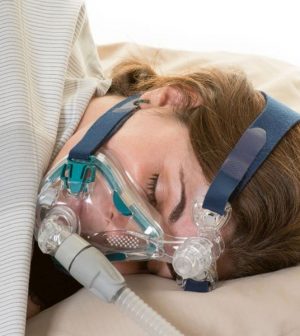- Recognizing the Signs of Hypothyroidism
- 10 Strategies to Overcome Insomnia
- Could Artificial Sweeteners Be Aging the Brain Faster?
- Techniques for Soothing Your Nervous System
- Does the Water in Your House Smell Funny? Here’s Why
- Can a Daily Dose of Apple Cider Vinegar Actually Aid Weight Loss?
- 6 Health Beverages That Can Actually Spike Your Blood Sugar
- Treatment Options for Social Anxiety Disorder
- Understanding the Connection Between Anxiety and Depression
- How Daily Prunes Can Influence Cholesterol and Inflammation
CPAP Mask for Sleep Apnea May Boost Daytime Activity Levels

CPAP therapy for sleep apnea may do more than help people sleep better. A new study finds use of the therapy is also associated with increased physical activity in people with heart disease.
The international study included more than 2,600 participants, ages 45-75. They all had heart disease and obstructive sleep apnea, a common condition in which the upper airway repeatedly collapses during sleep. People with sleep apnea often feel drowsy and sluggish during waking hours.
CPAP (continuous positive airway pressure) therapy is a common treatment for the condition. Patients receive mild levels of air pressure through a mask to keep their throat open during sleep.
“We were pleased to find that our CPAP users reported that they were better able to maintain their levels of activity over the four years of the study, and that they reported fewer limitations in moderate and vigorous activities including those that are important for independent aging, like walking up the stairs,” said study co-author Kelly Loffler. She’s a research fellow at the Adelaide Institute for Sleep Health at Flinders University in Adelaide, Australia.
Study participants were divided into two groups. One group received usual heart care plus CPAP, while a control group received usual heart care alone.
The participants self-reported their physical activity levels at the start of the study and over six months, two years and four years.
Over an average follow-up of 3.7 years, the CPAP group reported about 20% higher levels of moderate physical activity than the control group. Patients in the CPAP group was also more likely to report activity levels recommended by experts.
The increased level of physical activity among CPAP users in the study would likely provide them with significant health benefits over longer periods of time, such as lowering the recurrence of heart events, the researchers noted.
The study is in the February issue of the Journal of Clinical Sleep Medicine.
CPAP, when combined with lifestyle interventions such as diet and targeted exercise, will likely provide many users with a “benefit that goes beyond their reported sleep,” Loffler said in a journal news release.
Nearly 30 million adults in the United States have obstructive sleep apnea. Common warning signs include snoring and excessive daytime sleepiness.
More information
The U.S. National Heart, Lung, and Blood Institute has more on sleep apnea.
SOURCE: Journal of Clinical Sleep Medicine, news release, Feb. 16, 2021
Source: HealthDay
Copyright © 2026 HealthDay. All rights reserved.










